Children share their stories and display their strength
Before COVID-19 swept across the globe changing all of our lives, there were already millions of children facing the triple threat to their rights from conflict, climate change and food insecurity. Now, the pandemic is putting years of progress made to advance the rights of children at risk. The most vulnerable children living in crisis are being hit the hardest, yet they remain determined for a brighter future. Learn more about how girls and boys are standing strong in the face of crises:
Sarah* – 12 yrs old, Yemen
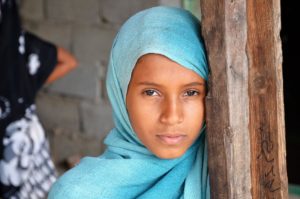
12 year old Sarah from Yemen was displaced from her home many times. This made it hard for her to attend school. Sarah said, “My family and I have been displaced since the war started. I used to go to school every day, but now I don’t. I lost all of my school documents and certificates when I fled with my family from the deadly airstrikes. I could have been in the sixth grade now if I had not missed two years during my displacement. I feel sad when I see my cousins going and coming back from school, but I hide my feelings.” Sarah was enrolled in the Save the Children child friendly space, where she met new friends and spent her time drawing and learning. “I want to be a police officer in the future to protect my family. I wish I could go back to my school and village; I wish with all my heart that the war stops.”
Layla* – 8 yrs old, Sudan
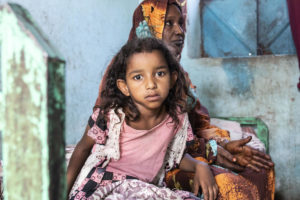
Layla is 8 years old and is from a nomadic tribe in Sennar state, Sudan. Life is very challenging for her and her family and they often live day-by-day without a regular source of income. Their home doesn’t have a toilet or any running water and they rely on sourcing water from their neighbours, which they store in plastic barrels and ceramic pots. Her community is one of the regions in Sudan impacted by the deadly cholera virus and Layla contracted it from severe flooding of contaminated water sources. She was so sick she could no longer stand up and her mother rushed her to hospital where she was treated. Save the Children’s Emergency Health Unit was rapidly deployed to Sudan to work with the Government of Sudan and the World Health Organisation to bring the cholera outbreak under control. A vaccination team supported by the Save the Children Emergency Health Unit travelled to Layla’s community to provide children and adults with the cholera vaccine. Layla and her family will now be protected from the disease for the next three years.
Shogofa* -9 yrs old, Afghanistan
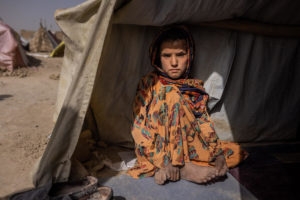
Nine year old Shogofa’s* house was hit by a rocket during fighting in her hometown in Afghanistan. During the attack she was critically wounded, suffering severe head injuries and losing several of her fingers in the blast. The incident killed three of her brothers and her mother still suffers from mental illness due to the trauma of what she witnessed. Shogofa was at home when the rocket hit, during the evening as they were about to start eating. Her mother was still cooking and then there was a loud explosion. As she sat crying she realized the extent of her own injuries, standing up to feel blood was pouring down her face and noticed that her hand had been severely injured. Her mother wiped her face and wrapped her damaged hand in a cloth but had to wait until morning before she could see a doctor as the fighting continued throughout the night. Shogofa says her family had “everything” in Fayrab province. They had a home and she enjoyed playing with her friends, but their lives changed forever because of the conflict. Now they live in a tent in a small dusty plain in Mazar province, sleeping and living in one tent with her mother, father, sisters and remaining brothers. She says they don’t even have a plastic bag to burn in their clay oven in order to cook food, their lives are very poor. In the future Shogofa hopes to move back home if there is no more war so that her sisters and brothers can play on the street once again. She wants to go back to school if there is peace and study to become a doctor so she can treat sick people. Shogofa attends Save the Children’s Child Friendly Space in the camp, a safe place where children can play and receive psychosocial support. Her family have also received support from our mobile health team in the region. Afghanistan is statistically the deadliest conflict for children. Close to one third of all civilian casualties are children.
Samira* – 14 yrs old, Syria
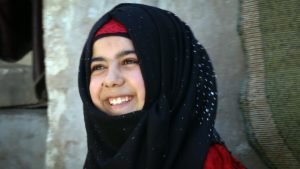
Samira and her family have been displaced for six years. They were displaced several times before settling in a camp in a town in northern Idlib, North West Syria, three years ago. All family members live in one tent, which barely fits them, and Samira’s father suffers from a mental disability. At the beginning of the year, Samira was enrolled in a Temporary Learning Space (TLS) supported by Save the Children’s partner organisation, Syria Relief, in the camp she lives in. As a result of numerous displacements and lack of education opportunities in the areas Samira and her family moved to, Samira is now in the fourth grade when she should be in the seventh. Samira was born with one lung and infantile paralysis in her left hand. When Samira first joined the TLS she was unhappy as she faced difficulties breathing, given that she only has one lung and the classrooms were crowded. She was also embarrassed of her paralysis. So Samira used to attend one or two classes than ask the Administration for permission to go home. As schools in North West Syria were suspended due to the Coronavirus pandemic, Syria Relief started providing students with remote education instead. This allowed Samira to resume her education without facing any difficulties regarding her breathing and has allowed her to regain her confidence. Samira hopes to become a teacher one day.
Nassir* – 12 yrs old, Ethiopia
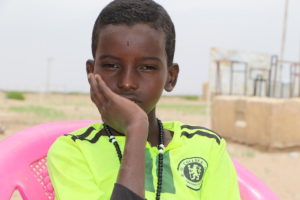
Nassir is a 4th grade student in the Somali region in Ethiopia. He is out of school but thanks to Save the Children’s mobile library, he is able to continue his reading and learning at home. Nassir said “Our teacher told us that the coronavirus, what we call Dury Arorey here [which means the angry influenza in the Somali language] is a tiny organism that we cannot see with our eyes. He also told us it spreads when sick people cough and sneeze near others. People who are sick have symptoms like cough, fever and have trouble breathing, I wish I could go to school, but our school is closed and I feel sad and upset that I cannot go to school. I miss my friends in school. Before the coronavirus, the school fed us meals each school day, but now the school feeding program has stopped. I hope it will start again soon. Our teacher also taught us how to protect others and ourselves from the coronavirus. Some of the things we learned are to wash our hands with soap and water, wave to people instead of shaking hands and we have to stay at least one metre away from people. We know we have to wash our hands but water is very scarce here. Therefore, it is very difficult for us to get enough water and soap to wash our hands and protect ourselves from the virus. I worry the virus could spread here in our village and hurt many people I know. Schools are closed but the mobile reading camp still comes to our village once a week. The librarian lends us storybooks that we can take home to read. I borrow different storybooks from the reading camp. I find it fun reading stories to my family at home. It also helps me improve my reading skills On behalf of the children in my village, I would like to say please bring us clean water and soaps so we keep clean and protect ourselves from this virus. I wish the virus would just go away so school opens again. I want to learn and become an engineer someday, support my family.”
Aisha* – 1 yrs old, Nigeria
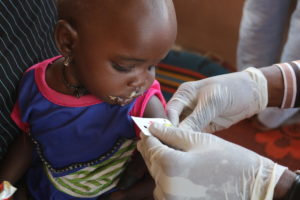
Falmata* is 28-years-old and lives in a camp in North East Nigeria. She is a married woman with six children, the youngest a baby girl who is just one-year-old. Her baby daughter, Aisha, has been suffering from malnutrition since birth, but she was unaware of this until a screening team diagnosed her on a visit to her home. She was then enrolled in the clinic and given treatment to try and help improve her condition. The Covid-19 pandemic has made life difficult for her and her family. Her husband couldn’t work because the market was closed where he used to sell his farm produce. This made it difficult to provide food for her children, but now restrictions have lifted her husband is able to go to the market and work once again. Aisha was born with a low birth weight and it was never diagnosed as they don’t treat malnutrition in her village. But since she was diagnosed and is receiving treatment at a Save the Children supported hospital center her condition has improved.
Stephanie* – 15 yrs old, Democratic Republic of Congo

15 year old Stephanie* believes education is very important – especially for girls – and is an advocate for children’s rights. She lives in North Kivu, in the far east of the Democratic Republic of Congo (DRC). North Kivu has experienced years of conflict and is currently the site of the world’s second largest Ebola Virus Disease outbreak. Conflict is a regular part of *Stephanie’s life and she says she cannot leave her house after 2pm because of the fighting nearby. She hears gunshots in the night and sees children fleeing the violence. Stephanie attended one of Save the Children’s Ebola awareness classes where she learnt how to protect herself from the disease. She feels like Ebola has killed the love in her community because people cannot touch or care for each other anymore.
The Ebola outbreak in North Kivu was declared on 1 August 2018. Within days, Save the Children deployed its Emergency Health Unit to respond to the crisis. Together with Save the Children’s DRC country team, the Emergency Health Unit has trained more than 1,200 health workers and almost 1,000 community leaders, and reached more than 1 million people with information through our community campaigns.
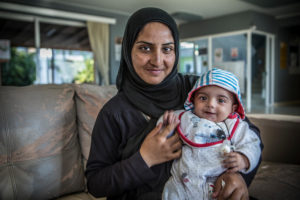
Nida* – 22 yrs old, Pakistan
Nida* 22 fled with her husband Javed*to Kos island, in Greece, from Pakistan while pregnant. The journey took 101 days. During their journey they were often left to sleep in the streets, without food or clean water. When Nida then 9 months pregnant arrived in Greece they had to sleep outside of the hotspot [camp] as there were no places available. Just 5 days after the birth of her son they had to go on foot from the hospital where the baby was delivered, back to where they were staying. Save the Children has been providing assistance to children and adults across Greece since August 2015. Our Mother and Baby Areas provide a safe space where caregivers, including mothers and pregnant women, can receive skilled advice and support on nutrition and breastfeeding. We also provide essential items such as nappies and baby wipes.
These are just a handful of stories, and there are millions more. Stories of children who in the face of adversity are resilient and determined to lead the way to a better tomorrow. All children have the right to survive and thrive. All children have the right to an education. All children have the right to be protected from harm and not be held back because of who they are or where they are from. Please join our movement to #ProtectAGeneration. Children cannot wait! The children and young people of today are counting on you to stand up and take action. Check out our campaign for ways you can support: www.savethechildren.ca/protectageneration


